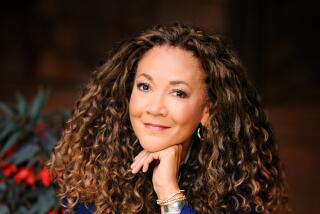Black man’s burden
- Share via
At some point, most African American men experience a painful social initiation. My son Ryan was 13 when his came. At the time, we were living in Oakland. I worked across the bay in downtown San Francisco, and Ryan was planning to take BART into the city to meet me for lunch. It was only his third or fourth time riding the subway alone, and even though he was practically 6 feet, he was known to get distracted, and I was a worrywart.
“Don’t talk to strangers; don’t miss the Montgomery Street stop; clue in to your surroundings. Move away from strange-acting folks.”
Without missing a beat, he quietly said, “Mom, relax. I think some people think I’m one of the strange-acting folks. Other mothers are probably warning their kids to stay away from people like me.”
My heart practically stopped. “Why do you say that?”
“Oh, I just noticed the last couple of times I was on BART, I could feel I was making several white women nervous when I sat near them.”
“How do you know that?”
“I could just tell.”
“I’m sure it’s your imagination,” I insisted. But deep down, I knew. I knew something had shifted, both in how the world viewed my son and in how he viewed himself. He couldn’t put his finger on it, but he knew something was up.
Racism is like that. A dripping faucet of sorts. You ignore it until you can’t anymore. I so desperately wanted to slow down the inevitable. Stop the drip. Couldn’t he have just one more year of innocence in which he could believe that his black skin was nothing more than what it is — a physical attribute rather than the definition to others of who he is and what he can or can’t do.
But Ryan was already one step ahead of me in coming up with coping strategies.
“Don’t worry, Mom, I figured out a solution. I just take out a book and start reading, which seems to make everybody relax.” One woman, he said, even asked if he was enjoying a particular book as much as she did.
As a black woman who loves two amazing black men — my husband and 23-year-old son — I have seen again and again how society either assumes the worst of them or treats them as an exception to their race and manhood. It is a minefield black men must navigate.
During Ryan’s teen years, he struggled, sometimes lashing out at us. After reading “The Autobiography of Malcolm X,” he concluded that my husband and I were “Toms” for our “bourgeois lifestyle” — a lifestyle he took full advantage of, I might add. Other times, his anger was directed at anyone who looked at him sideways.
One day when he was 16, he stormed into the house complaining to no one in particular: “Why does everyone assume that just because I’m black, I play basketball? That’s just plain racist.”
My husband, without looking up from the newspaper, responded nonchalantly, “Do you think it has anything to do with you being 6-foot-5?”
Ryan grunted something under his breath before lumbering off to his room. But we all knew that although that was undoubtedly part of the equation, it wasn’t all of it.
Like so many other young black men, Ryan made it to adulthood armed with both the understanding and the burden of what it means to be a black man in America. He has no illusions. He knows that he has to be better than others at whatever he decides to do in life, and that he has to be more careful. That’s the part I worry about most.
Recently, Ryan started graduate school at the University of North Carolina, where he is working toward his doctorate in history. The night he and my husband arrived in town to move him into his new apartment, they were stopped on the interstate by the police, allegedly for not moving to the outer lane when passing a police car that had stopped another driver.
Male relatives later told us that this particular stretch of road was treacherous territory for black men, especially for those driving cars with out-of-state license plates. My husband told me he was glad to have been there to model for Ryan how to behave during a police stop, something every black man needs to be prepared to handle. Like it or not, racial profiling still plays into many law enforcement decisions. Odds are that even as Ryan prepares for life as a law-abiding historian, this will not be his last unsolicited encounter with the police.
The days are long gone when I can protect Ryan from the inequities of life. But I pay attention to the news, and I worry. This winter I was not alone among black mothers to be dismayed when police identified a “person of interest” in the killing of publicist Ronni Chasen. The man, who ultimately killed himself, was thought to have possibly shot Chasen while riding his bike through Beverly Hills late at night. He was black.
This year, when my son was home for the holidays, I found myself in worrywart mode again. It was all I could do to resist making a motherly suggestion: Perhaps the city of Beverly Hills should be off-limits for any bicycle outings.
Judy Belk lives in Los Angeles and writes frequently about race and family issues.


